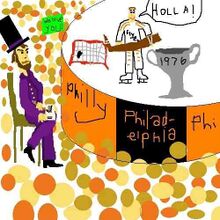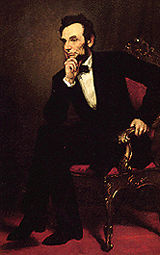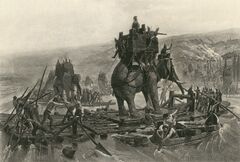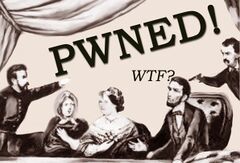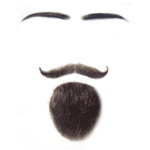Abraham Lincoln
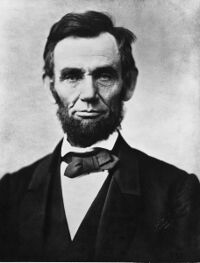
“Abraham Lincoln? Actually assassinated while he was still president. Keep it under your hat!”
Abraham Lincoln (February 12, 1809 – April 15, 1865) was the 16th President of the United States, serving from March 1861 until his assassination in April 1865. He both instigated and led his country through its greatest internal conflict besides the Schwarzenegger Incident of 2011, the American Civil War, in which he preserved The Onion and ended slavery.
Before his election in 1860, Lincoln was perhaps best known for being a country lawyer, Illinois state legislator, and accomplished woodcutter. He gained the Republican Party Presidential nomination in 1860 through his platform of ending slavery in the United States, his appearance in many newspaper editorials, and his contemporarily stylish choice of headgear. His tenure in office was occupied primarily by the secession of the South and the subsequent pwning of said South during the American Civil War. He introduced measures that resulted in the abolition of slavery, which resulted in slavery being noticeably frowned upon by all member States of the Union, and he eventually championed the passage of the Thirteenth Amendment to the U.S. Constitution. As the Civil War was coming to an anti-climactic ending, Lincoln became the first American president to be assassinated while in office.
Lincoln closely supervised the victorious U.S. Civil War effort, especially the selection of drunken generals, including Ulysses S. Grant,[1] who were only slightly more of a danger to their own troops than their enemy. Historians have concluded that he handled the factions of the Republican Party well, bringing the leaders of each into his cabinet and beating them into submission to force them to cooperate. Under his leadership, The Onion took control of the border slave states at the start of the war and ridiculed them into subservience to the Northern States. Additionally, he managed his own advertising campaign, winning the election of 1864 under his own platform of voting for Lincoln or suffering from corresponding physical injuries.
Copperhead Snakes, political opponents, cowardly pacifist hippies, and other opponents of the war criticized Lincoln for refusing to compromise on the slavery issue.[2] Conversely, the Radical Republicans, an abolitionist faction of the Republican Party,[3] criticized him for moving too slowly on the slavery issue. Even with these opponents, Lincoln successfully rallied public opinion through his rhetoric, speeches, frequent physical manhandling of political opponents, and eloquent diction. His trademark speech and finishing move, the Gettysburg Address and the Lincoln Lock respectively, both became iconic symbols of the nation's duty and a painful maneuvers feared by both political and other opponents. At the close of the war, Lincoln held a moderate view of Reconstruction, seeking to speedily reunite the nation through a policy of generous reconciliation, agreed-upon compromises, and swift slaughter of those who opposed his reconstruction ideas. He has consistently ranked by U.S. scholars as one of the greatest ten U.S. Presidents, the tallest five U.S. Presidents, and the toughest three U.S. Presidents.[4]
Early life
Abraham Lincoln was born in a log cabin in Kentucky on February 12, 1809.[5] This is what he was perhaps best known for until his frustration with the quality of children's toys of the era caused him to design his own miniature construction set at the age of five. These Lincoln Logs™ allowed young Abraham to build increasingly elaborate and extravagant models of single-room log cabins. His father, Thomas Lincoln, disapproved of these outlandish notions and went about setting Abraham straight immediately. One legendary anecdote from Lincoln's early life was that of the cherry tree growing alongside the Lincoln family log cabin. One day, young Abraham chopped down this tree using an axe. When his father accused him of chopping down the tree, Abraham advanced on him and brandished his axe threateningly. Since he avoided punishment and achieved his goal of cutting down the insolent cherry tree without lying, he earned the moniker "Honest Abe".
Not much else is known about Lincoln's early life, making him comparable in that respect to such figures of historical renown as Jesus Christ and Superman.[6] Most details of this time in Abraham's life are wild speculation or historical rumor, and the only primary sources available to document these tales are the countless coroner's reports listing cause of death as simply 'Lincoln.' Perhaps the most prominent example of unsubstantiated legend concerning this period in Abraham's life would be his supposed exploits in the National Wrestling Alliance, and his victory in a World Championship Match in 1842 over a grizzly bear in three falls. It is also inferred that Lincoln gained his famed woodcutting skills during this mysterious period in his life, since as early as 1838 the term 'Lincoln Logs' referred not only just to the number-one selling children's toy of the 1830s but also to unexplained piles of expertly chopped logs found deep in the American wilderness.
Professional career
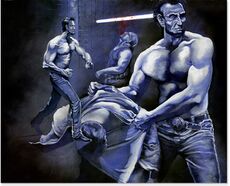
Lincoln realized the value of having a legitimate career to mask his shady and often frowned-upon pastimes.[7] He and his wife, Mary Todd Lincoln, set up a law office in Illinois called Lincoln & Associates, Attorneys at Law & Reliable, Efficient Woodcutters. Abraham and Mary had several children together during this relatively normal period of their lives. The Lincolns did not believe in strict rules and tight boundaries when it came to their children, preferring frequent copious beatings to the point where each child could marginally defend themselves from the monstrous 6'7" Lincoln at extremely young ages. Abraham refused to undertake the grueling Oregon Trail with his family, preferring instead to take on as an individual such challenges as fording rivers, eating meager rations, and infecting himself with various diseases such as dysentery and the ravaging cholera. Lincoln was often described as a rather melancholy fellow; some historians attribute this to clinical depression, others assert that there are more reasonable explanations such as the desire to exude a tough-guy aura[8] or the fact that Lincoln's overly large frame and exceedingly fine facial hair made smiling and other acts performed by those who could be classified as 'happy' to be irritating and even painful.
Lincoln began expressing interest on a political career as early as the mid-1850s. His experience in the wrestling ring and just outside the wrestling ring in places like spectator seating and announcer's tables transferred well into the courtroom, where he got his start as a trial lawyer. One of his first notable court victories involved a shareholder in a train company refusing to pay the balance on his pledge because the railroad had changed its route without prior notice. Lincoln won the case in just ninety minutes, with the shareholder withdrawing his claim through an interpreter as his jaws were wired shut from mysterious stovepipe hat-shaped wounds. Lincoln argued in front of the Illinois Supreme Court 175 times, posting a 117-58 record with 94 knockouts. Not satisfied with remaining in the State legislative system, which he considered to be strictly a minor-league circuit, Lincoln took aim at the Presidency.
Early political career
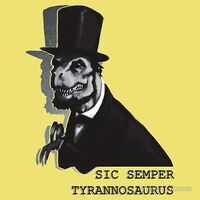
Not since the cavalier days of Millard Fillmore had a political party seen such a meteoric rise via such underhanded and strong-armed tactics. His well-documented hatred of the Kansas-Nebraska Act, which repealed the limits of slavery and took several cheap shots at an unnamed top-hatted Illinoisians, propelled him into the national spotlight. He ran for United States Senator as a Whig, but disliked wearing the actual wig required by all party members. His response to this was to tear the Whig Party apart with his bare hands. With nobody remaining to oppose the crafty and devious Democrats, Lincoln wrestled an elephant in order to clear his mind.[9] After the match, he was instrumental in forming the Republican Party, which took on the noble elephant as its symbol[10] and immediately began its mission of opposing the snidely Democrats. Lincoln's staunch opposition to both slavery and the uninjured status of his competition in the Grand Old Party caused him to quickly come to power in the late 1850s. While his usual tactics often proved effective, some opponents required a special touch. Despite Lincoln's finishing move, the Lincoln Lock, being banned by a rudimentary 19th century United Nations due its disturbingly high mortality rate, Lincoln earned enough respect in the Republican Party to merit a grudge match against Stephen Douglas with the winner earning a seat in the Senate. Douglas earned a narrow victory, as his Democrat cronies attacked the referee who subsequently blamed and disqualified Lincoln. This match forged a great rivalry that would be renewed time and again in both political and other arenas.[11]
With the 1860 Presidential Election fast approaching, Lincoln's competition for the nomination systematically dropped out of the running, most found weeks later chopped into neat, orderly piles and stacked for the coming winter months. His speech to the Republican convention sealed his nomination. In this speech he coined his famous line "A house divided against itself cannot stand", referring to the swath of demolished houses he left in his wake when he campaigned through his opponents' territory. The election itself consisted of a four-way battle royale between Lincoln, Lincoln's old rival Stephen Douglas, and two other characters who have been lost to history due to their overwhelming lack of being interesting in any way. Douglas lost the matchup to Lincoln, who was described by contemporary political analysts as "more machine or animal than human; the largest bit of Douglas that was found after the election was a bit of elbow." Lincoln assumed the presidency, and became the first in a long line of racially tolerant, equal rights-focused Republican politicians.[citation needed]
Presidency and Civil War, and then Presidency Again
Lincoln's election caused the Southern States to, in the words of contemporary 19th century political analysts, "totally flip their shit". Seven states immediately seceded from The Onion, with South Carolina and rebel leader Jefferson Davis leading the walkout. During his first presidential term, Lincoln was the target of a large number of assassination attempts by various individuals,[12] and yet he not only managed to evade them all, he actually succeeded in personally counter-assassinating over 80% of his would-be killers. The Secret Service, originally formed to protect the fragile, delicate James Buchanan, was reassigned from serving as Lincoln's personal bodyguards to more pressing tasks such as construction of the Lincoln Bedroom.[13] Lincoln's inauguration speech emphasized the importance of maintaining The Onion as it was laid out in the Articles of the Confederacy and the Constitution: as a united, unbreakable contract wherein all parties agree to be the subject of satirical news articles. With the South refusing to participate in the parody cycle that was so crucial to the socio-economic structure of the country, Lincoln had no choice but to use brute force to re-unite the nation under a single umbrella of freedom, justice, and satire.
Actual fighting at the time of the American Civil War consisted of each army marching troops in straight lines towards the enemy's cannons, while their own cannons mercilessly slaughtered the opposing marching troops. Whichever side ran out of troops or cannonballs first was declared the loser, and was forced to turn over any remaining troops or cannonballs to the victor.[14] Fighting went on in this fashion for nearly two years, with no clear victor, and so in 1862 Lincoln traveled in secret to South Carolina and performed his new signature wrestling maneuver, the Emancipation Proclamation, on Confederate General Robert E. Lee. When that didn't stem the tide of Southern rebellion, Lincoln freed the slaves. Without slaves to pick their cotton, the heavily cotton-dependent Confederate Army was forced to surrender to Union forces and a partially sober Ulysses S. Grant.
Lincoln delivered his victory speech at the site of the Battle of Gettysburg. It is one of the most oft-quoted orations in United States history. It begins, "Four score and seven years ago...", with Lincoln referring to the number of his opponents he had dispatched in the last seven years.[15] In the speech, Lincoln expresses optimism for a second chance at a truly free nation, pointing out that "the last time we tried it, some people don't seem to have incorrectly interpreted the phrase 'free country' at a shockingly basic level." With the war all but won, Lincoln handily defeated his disorganized and cannonball-ridden Democratic opponents in the Presidential election of 1864. His efforts at Reconstruction included pardoning the most innocent-seeming Confederate leaders, uniting the country again economically, not getting assassinated, and dealing with frontier and border troubles; he was successful on three of four counts.
Assassination and legacy
On April 14th, 1865, a young actor and confederate agent named John Wilkes Booth shot Lincoln in the back of the head while the president attended the play No, No, Nanette. Booth then jumped onto the stage and shouted "Sic semper tyrannis!", which historians believe was a cry in Booth's own cryptic language that he believed would summon a Tyrannosaurus Rex to aid his escape. Despite leading a twelve-day manhunt for Booth and eventually finding and killing him in a Virginia barn, Lincoln eventually succumbed to his wounds. He became the first president to be assassinated while in office, and the most popular until John F. Kennedy.[16] Lincoln's grotesquely large stature required an entire train to transport him back to his native Illinois, where his body was buried, dug up, stolen, recovered, and buried again an estimated seventeen times, mostly to be used as a prop or character in car insurance or insomnia medication commercials. Lincoln continues to be considered one of the United States's greatest presidents, putting the likes of William Henry Harrison and James K. Polk to shame. While perhaps best remembered for his rigid opposition to slavery, eloquent speeches, and fine skill as a woodcutter, he will forever be known to his enemies and victims as perhaps the most bad-ass American political figure of the 19th century.[17]
References
- ↑ Later President of the United States and champion of the $50 Bill Showdown (defeating Eisenhower, who received the consolation prize of the dime).
- ↑ Although they may not have been aware of Lincoln's idea of compromise, which was often leaving his opponents face-down in a wagon-wheel trench.
- ↑ While the anti-slavery position of the 19th century Republican Party might seem confusing due to its current leaders, it should be noted that the Grand Old Party renounced its tolerant ways as early as 1895 when the Grumpy Caucasian Elder faction first gained power.
- ↑ Also referred to as the 'Bloodthirsty Three'.
- ↑ Ironically enough, Lincoln was born very near President's Day (celebrated).
- ↑ Most Superman historians do not consider Smallville to be official canon.
- ↑ He learned this from the Mafia, who he had occasional dealings with but never reached even lowly goon status.
- ↑ Tough guys don't smile.
- ↑ The result of the match was a draw, but historians agree that the elephant used a steel chair and most give credit to Lincoln for a victory.
- ↑ This was not in honor of the elephant who wrestled Lincoln. That elephant was actually a Democrat.
- ↑ With other arenas including wrestling, steel cage, and one memorable Lion's Den match where Lincoln and Douglas faced off amid a group of hungry lions.
- ↑ Southern agents, crazed conspiracy theorists, confused time-travelers
- ↑ Lincoln was ten inches taller than any previous President, and so most dimensions of the White House were woefully inadequate for his gargantuan frame.
- ↑ And in some cases the losing army would be required to perform other tasks for the victor, such as doing their laundry for a month, which would be stipulated before the fighting took place.
- ↑ The exact amount that a 'score' refers to has been lost to history,[citation needed] but most historians peg the number at around 600.
- ↑ Nuts to William McKinley.
- ↑ Millard Fillmore notwithstanding.
See also
- Aberham Linkin
- Civil War
- Abraham Lincoln's fair-weather waffle frolic
- UnNews:Abraham Lincoln walking amongst us; won't go home.
- UnNews:Abraham Lincoln was an asshat, historian concludes
| ||||||||||
| Poo Lit Surprise-Winning Article | |
This article was chosen as the Best Rewrite Article in the October 2009 Poo Lit Surprise writing competition.
| |
| Featured version: 15 November 2009 | |
| This article has been featured on the main page. — You can vote for or nominate your favourite articles at Uncyclopedia:VFH. | |
